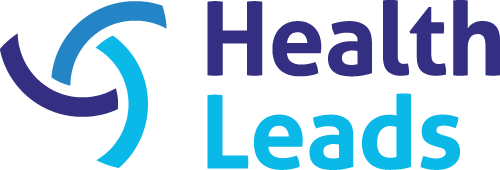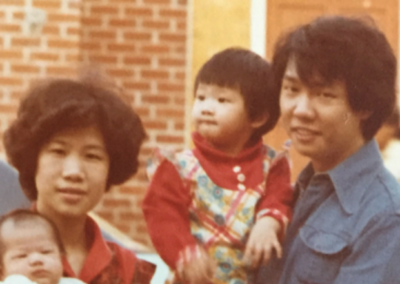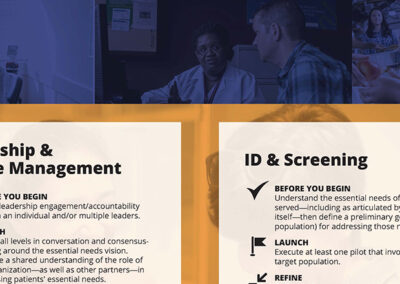Healthcare’s Mainstages Need More Experts in Lived Experience

At one of the busiest annual healthcare conferences, I spoke with a re-entry health conductor about the many credentials we saw listed at the end of hundreds of presenters’ names. She proudly noted that when presenting, she always adds “ELE” at the end of her name — Expert in Lived Experience. As a person who proudly lists MSc credentials, the conversation made me stop and think about how highly healthcare conference and event organizers value academic achievement. And I’m reminded of this point each time a conference agenda is released; there just aren’t many ELEs listed as speakers.
At a time when an increasing number of healthcare organizations are driving toward more equitable outcomes through community-led health improvement initiatives, it’s the ELEs whose voices are more important than ever. It’s time to see that value reflected on healthcare’s mainstages — and here’s how we get there.
Pursue Speaker Line-ups that Reflect Today’s Healthcare Realities
Care teams, workflows and leadership structures in healthcare are evolving. Health systems increasingly recognize — and fairly value — the expertise of community health workers and other care coordination roles. Patient and community advisory councils are playing a larger role in driving action to overcome the biggest barriers to health. Care teams more frequently meet patients outside of traditional clinical settings. So why don’t we see speaker line-ups at industry conferences and events match this new reality?
In my role at Health Leads, I review a lot of calls for abstracts and have a front row seat into what’s happening at different conferences — the hot topics, the top speakers, the proposals that make or don’t make the cut. More often than not, presenters and panelists have executive-level titles and/or postgraduate degrees. Even the most forward-thinking conferences tend to build agendas dominated two-thirds or greater by senior-level leaders. And I get it: when you’re asking people to pay a lot of money for conference registration, and many expect to see big names and titles on stage. But often the information and expertise that’s most helpful to improving registrants’ work lies with front-line staff, community members and other experts in lived experience. It’s time our conference agendas caught up with this reality.
Don’t Let Systemic Barriers Get in the Way of Progress
To be clear, recent conferences have made important progress in highlighting ELEs in key roles, but academic-oriented event organizers may not consider the barriers that might prevent ELEs from fully participating. Over the past two years, I’ve noticed an upswing in conferences requesting submissions that include presenters who are community health workers or community members with lived experience, but that doesn’t always translate to the final conference agenda. So what causes the disconnect? Are abstracts not including ELEs? Are abstracts that do include ELEs not selected? Or are abstracts selected without offering the necessary support to ensure ELEs can participate?
We have to consider the systemic barriers that make it more difficult for ELEs to make it to the mainstage. Conference presenters must have the privilege to take time away from the clinic or office for travel. They must have the privilege of working for an organization that supports these types of opportunities — and can afford to pay for conference registration, accommodation, travel and food. They must have the privilege to afford childcare while away or have a support system that can help fill gaps. They have the privilege of comfort delivering presentations in English to English-speaking audiences.
Follow Strong Examples
Fortunately, healthcare event organizers don’t have to start from scratch. Just in the past year, a number of conferences have made important strides in breaking down barriers to help elevate new voices with lived experience. They offer strong examples for others to follow:
- Community Information Exchange (CIE) Summit: At this year’s CIE Summit, a Health Leads presentation featured a community resident leader whose first language is not English. Live translation services are not commonly offered within the current conference system, so Health Leads worked with CIE to bring in a translator and supporting equipment. This ensured session attendees were able to learn from the person with the right experience, not just someone who could most easily attend and participate.
- 2019 All In National Meeting: The 2019 All In National Meeting didn’t just ask for individuals with lived experience or community health workers to be part of abstract submissions — they made sure costs weren’t a barrier for presenters and speakers. This year’s conference covers the costs of travel, accommodation, food and registration for all lived experience presenters.
- 2019 Unity Conference: This annual conference organized by the National Association of Community Health Workers offered very wise advice to potential supervisors, program managers and other leadership-level attendees: You don’t need to attend these conferences. Be a good ally and sponsor your CHWs’ attendance instead. Cover all of their costs. And when your colleagues come back from the conference, listen as they share what they’ve learned and support them in implementing findings and suggestions.
- 2019 ACHI National Conference: A presentation featuring two Community Health Navigators focused on their lived experience and expertise — fostering a conversational environment to share first-hand community engagement knowledge and answer audience questions. The Navigators were able to share a level of detail and insight into their initiatives that would not have been possible if senior-level positions presented.
Here’s something that’s held true across the board: when Experts in Lived Experience present, the audience listens. At every ELE-led session we attended over the past year, participants hung onto every word — listening to and valuing the expertise and lessons learned by those who are doing the work and know their communities best. Based on feedback from a cross-section of partner organizations, these presentations and panel discussions were often the most memorable sessions.
If we truly hope to advance community-centered health initiatives that improve outcomes and reduce costs, conference and event organizers must value Expert Lived Experience as much as we do executive titles and academic credentials. And we need to remove barriers that prohibit speakers from sharing critical lived and front-line experiences with conference participants. Participating organizations invest in these events to develop staff, learn from promising practices in their field and foster new pathways and partnerships to improve community health. Let’s make sure those opportunities are fully realized by incorporating and valuing the expertise of ELEs.




